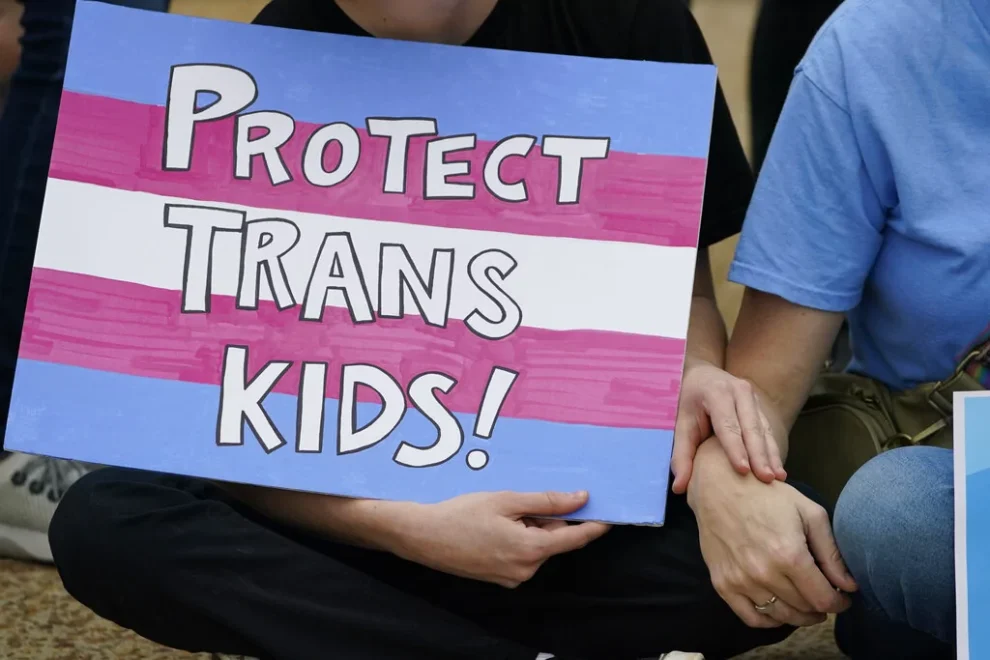The Supreme Court is poised to grapple with one of the most hotly-contested culture war disputes before the end of this year: whether parents have a right to defend their children from undergoing transgender procedures.
As early as December, the nine justices could hear oral arguments over a constitutional challenge to a Tennessee law that restricts access to puberty blockers, hormone therapies, and surgeries for the purpose of gender transitions for minors. The law does not bar these procedures for transgender adults.
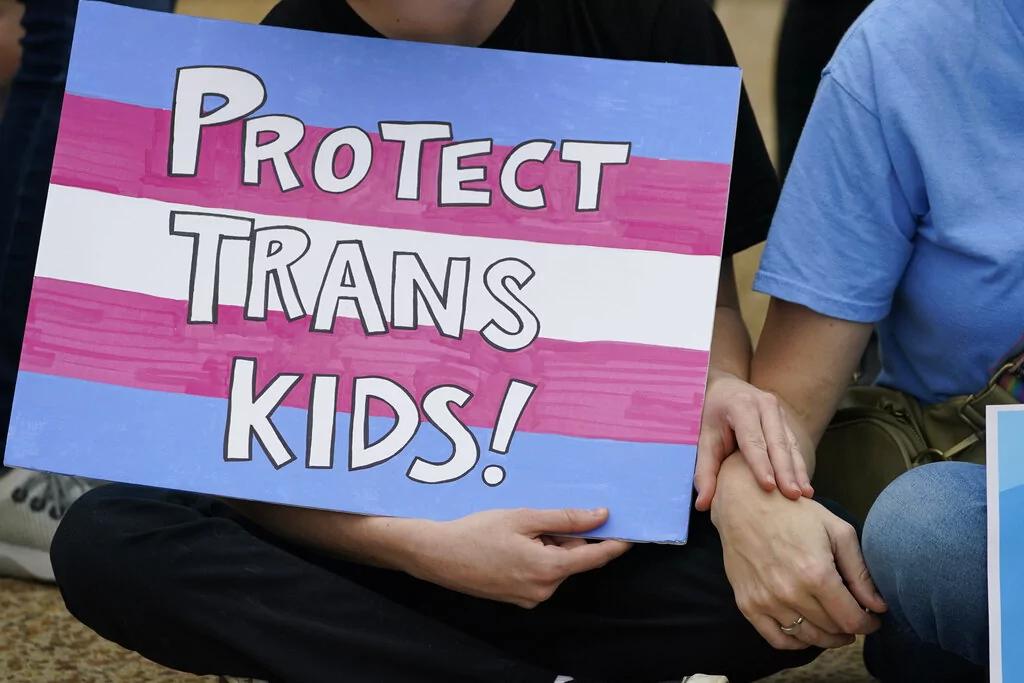
Tennessee Attorney General John Skrmetti (R) recently described the battle to defend the state’s law as one between “a few scrappy Tennessee attorneys” versus the American Civil Liberties Union and Lambda Legal, two of the largest firms that often promote pro-LGBT and transgender causes.
“And then the Justice Department jumped in,” Skrmetti said during a Sept. 17 appearance on the Michael Patrick Leahy Show.
“I am proud of the team that’s been working on this case,” he added.
The advent of allowing people under the age of 18 to undergo chemical- and surgical-based gender transitions has become a hotbed of contention. Republicans say parents should have the right to intervene or dispute whether their children can undergo these treatments, primarily on the basis that the treatments can have life-altering impacts on fertility and long-term health well after puberty.
Meanwhile, the ACLU professed that the law, which is currently not in effect pending this litigation, would “require trans youth currently receiving gender-affirming care to end that care within nine months of the law’s effective date.”
“This means, for example, a doctor could prescribe estrogen to a cisgender teenage girl for any clinical diagnosis but could not do the same for a transgender girl diagnosed with gender dysphoria,” according to the ACLU.
The case, which has yet to be scheduled for arguments, is likely to be one of the most contentious courtroom battles since the Supreme Court overturned Roe v. Wade in the summer of 2022, which allowed states to impose gestational limits on abortion.
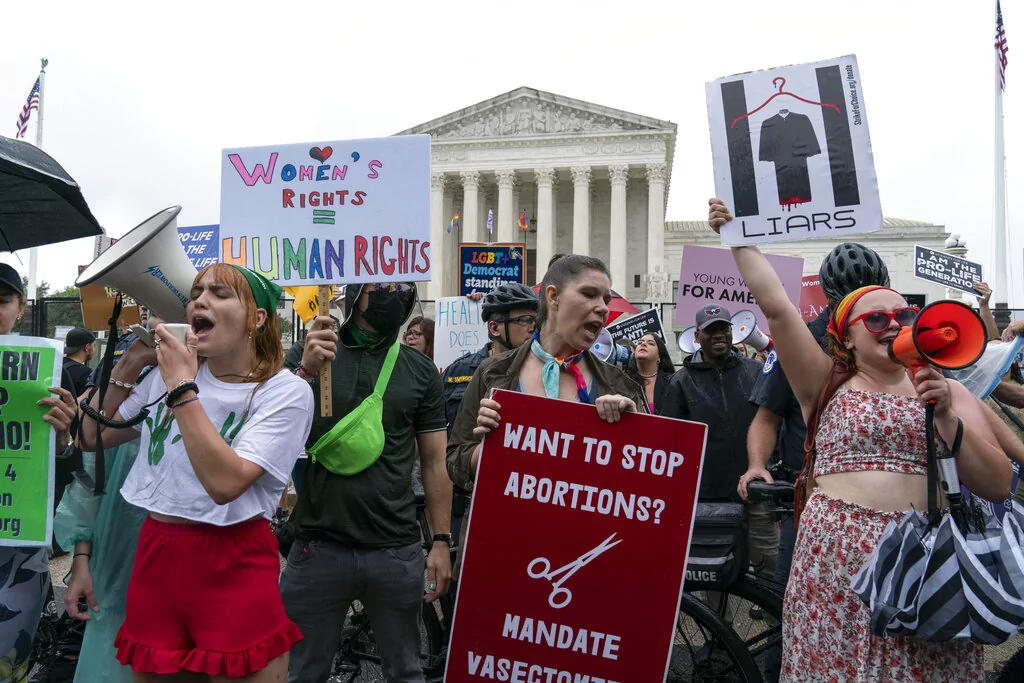
Protests continued for months after a leaked draft opinion in May 2022 signaled the overturning of Roe, and the ACLU is already calling on supporters of transgender procedures to “Show Up at the Court.”
“The moment the court releases its schedule, the ACLU will let our supporters know how to join us outside the court for a rally. We need a joyful, peaceful, and loud show of support for transgender people and their families,” the group said in a Sept. 5 blog post to its webpage.
Facts of the Case
The Supreme Court has been asked to decide whether Tennessee’s Senate Bill 1, which blocks all medical treatments intended to allow “a minor to identify with, or live as, a purported identity inconsistent with the minor’s sex” or to treat “purported discomfort or distress from a discordance between the minor’s sex and asserted identity,” violates the Equal Protection Clause of the 14th Amendment.
A decision in the case, U.S. v. Skrmetti, will determine whether access to transgender procedures for minors will be blocked in Tennessee and Kentucky, two states where a federal appeals court sided in favor of these restrictions.
However, the ruling will greatly inform lower courts as to whether similar laws in 24 states that ban hormone therapy for minors can survive constitutional scrutiny.
Some states have had success defending the laws in court from lawsuits backed by the ACLU, which initially brought lawsuits against Tennessee and Kentucky before the government intervened. Meanwhile, states such as Montana and Arkansas have seen similar bans blocked by federal judges.
In July of last year, the U.S. Court of Appeals for the 6th Circuit sided with Tennessee and Kentucky laws banning transgender treatments for minors. The DOJ subsequently intervened and requested the Supreme Court to rule on whether the laws are constitutional.

The question in Skrmetti is more narrowly tailored to hormone therapies, such as replacement therapy and puberty blockers, and does not implicate surgeries.
“The law also prohibits surgical procedures provided for the same purposes, but that prohibition is not at issue here,” according to the complaint from Solicitor General Elizabeth Prelogar.
Medical debate on transgender medicine for minors
The plaintiffs in the case include a Nashville-based couple and their male child who identifies as a girl, and a Kentucky-based medical provider who supports procedures for minors. Plaintiffs cite a wide body of evidence that providing puberty blockers and cross-sex hormones to teens with gender dysphoria is highly correlated with improved mental health outcomes later in life.
The Endocrine Society, the American Medical Association, and the American Academy of Pediatrics all support hormonal treatment, including both puberty blockers and cross-sex hormones, for youth with gender dysphoria.
Much of the medical criticism on transgender medicine for minors, however, has come from the international community.
In April, a landmark comprehensive overview was published by the United Kingdom’s National Health Service, led by renowned British pediatrician Hilary Cass.
The nearly 400-page Cass report ultimately found that evidence for hormonal based therapies to treat gender dysphoria in minors is “built on shaky foundations” and supported by “remarkably weak evidence.”
Instead of hormonal or surgical intervention for minors, the Cass report recommends a holistic assessment of the child that takes into account mental, neurodevelopmental, and social factors.
Following the publication of the Cass report, the U.K. NHS officially prohibited the use of puberty blockers as a treatment for youth with gender dysphoria, and the new Labour government has committed to starting clinical trials to develop more evidence-based standards of care.
In July, an international group of 21 endocrinologists from nine countries pushed back on U.S. guidance on transgender medicine in an open letter published in the Wall Street Journal. The group condemned the politicization of youth gender transition in the United States, saying that there is little to no support for hormonal treatment improving the mental health of minors with gender dysphoria.
Precedent on transgender cases
In 2020, the Supreme Court ruled 6-3 in Bostock v. Clayton County that a federal law barring sex discrimination in employment protects people who identify as LGBT, holding that Title VII of the Civil Rights Act of 1964 protects individuals from workplace discrimination.
The ACLU derives its legal argument to fight against Tennessee’s law from the foundation of Bostock. Likewise, the government contends that the 6th Circuit erred in its Bostock analysis when siding with Tennessee.
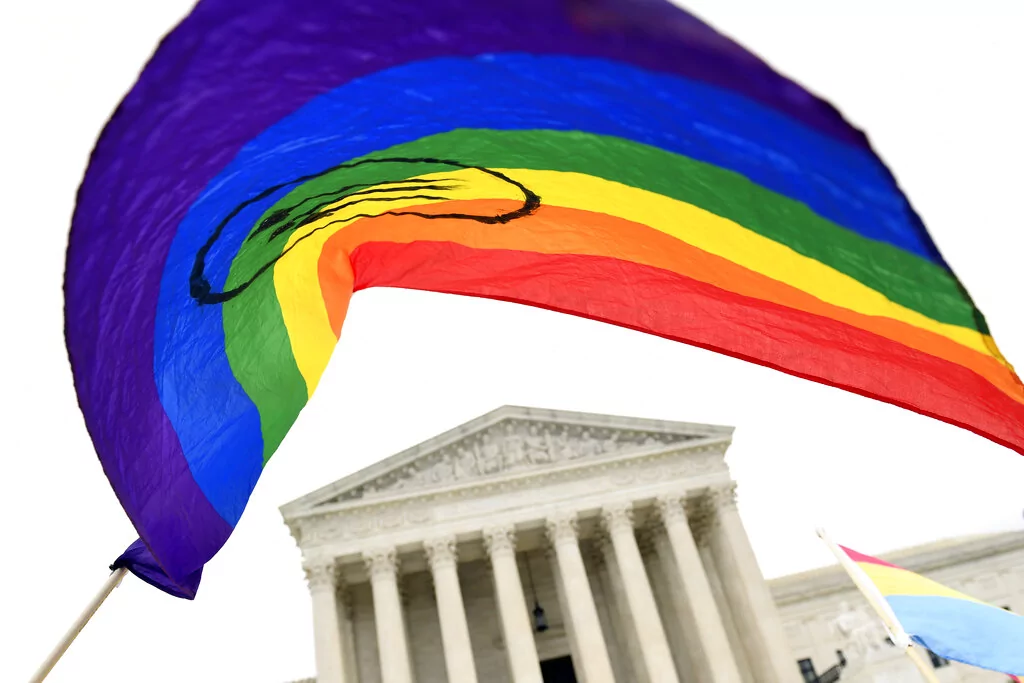
“Transgender adolescents have been treated for gender dysphoria with puberty blockers and hormones for decades,” Prelogar wrote in the government’s brief, arguing the nine justices should find Bostock is applicable to the Republican state laws.
However, Skrmetti argued that Bostock and the suit against SB 1 have little to do with one another.
“Bostock expressly did ‘not prejudge’ the meaning of other laws governing sex discrimination,” attorneys from Skrmetti’s office wrote in a brief to the high court.
The Tennessee attorney general furthered that even if Bostock did apply to the contested law, it would support the state, because the precedent emphasized that a court must use a “comparator” to determine whether an act discriminates.
“In Bostock, male and female employees were similarly situated because ‘[a]n individual’s homosexuality or transgender status is not relevant to employment decisions,’” according to the filing from Tennessee’s counsel.
By contrast, the act of using testosterone or estrogen to treat a deficiency and restore naturally occurring levels “is in no way similar to using those drugs to elevate hormone levels far above the naturally occurring baseline to induce or prevent certain physical changes.”
Although Skrmetti will be the first Supreme Court case on the constitutionality of laws regulating gender transition medicine, this is not the first time the high court has been asked to weigh in on transgender social issues.
In all other cases surrounding transgender disputes, whether it be bathroom laws or fairness disputes over boys participating in female sports, the justices have declined to weigh in on these issues.
Biden Administration support for transgender medicine
President Joe Biden, in June 2023, said state bills against transgender medical care are “cruel and callous.”
“It’s wrong that extreme officials are pushing hateful bills targeting transgender children, terrifying families, and criminalizing doctors,” Biden said. “These are our kids. These are our neighbors.”
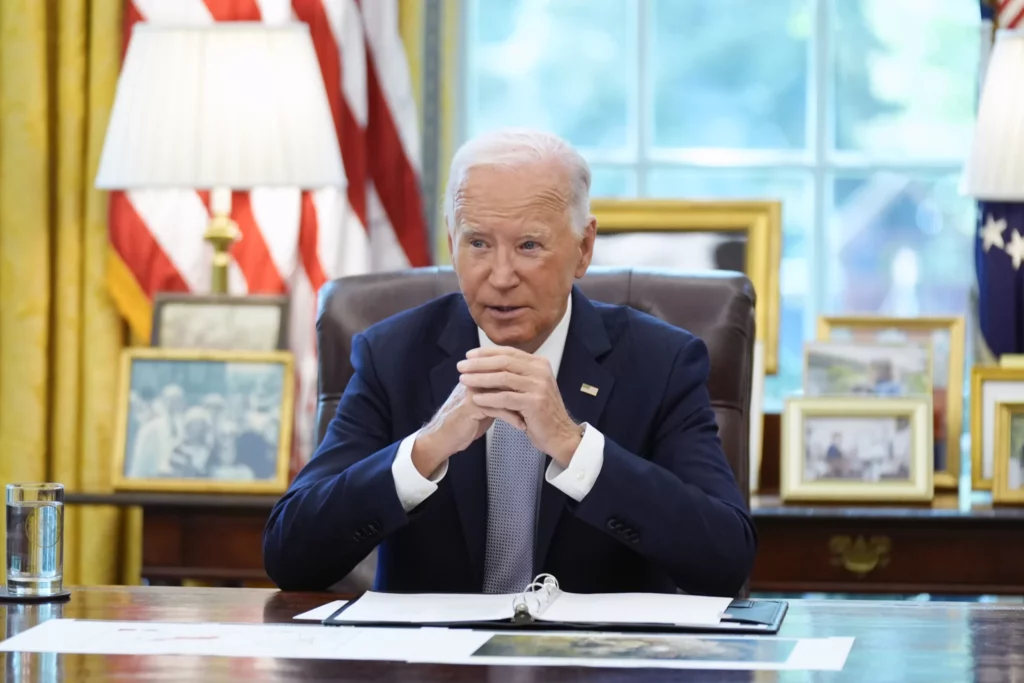
But the difference between minors taking hormonal therapies versus pursuing invasive surgeries, such as mastectomy or vaginoplasty, has been a thornier matter for the administration.
Documents uncovered in June revealed that staff for Assistant Secretary for Health at the Department of Health and Human Services Rachel Levine pressured an international group of medical experts to remove age limit guidelines for transgender surgeries on minors.
Emails between Levine’s staff and officials with the World Professional Association for Transgender Health show that the Biden administration stressed to the organization the political importance of dropping age requirements for obtaining gender transition surgeries, urging the group to change recommendations in their standards of care guidance.
The age recommendations, which were in the December 2021 draft of the WPATH Standards of Care, were stripped from the final version published in September 2022.
Levine, a biological male who identifies as a transgender woman, underwent surgical gender transition in 2011, after having been married and fathering two children.
Following outcry about the involvement of Levine’s office in the creation of the WPATH guidelines, a White House spokesperson in July clarified that the Biden administration believes “these surgeries should be limited to adults.”
“We continue to support gender-affirming care for minors, which represents a continuum of care, and respect the role of parents, families, and doctors in these decisions,” said the White House spokesperson.
Implications of the election on the case
Despite the high stakes of the case involving Tennessee and Kentucky, the 2024 election and the chance for a change in administrations could lead to the case being tossed out should former President Donald Trump win the race for the White House in November.
But if oral arguments do happen in December, meaning the case will have been heard before the next president’s Jan. 20 inauguration, some sources involved in the case told the Washington Examiner that a Trump administration may seek to change the DOJ’s posture on the case while still maintaining the justices’ ability to issue a ruling.

In June 2023, Trump put forwarrd his “plan to stop the chemical, physical and emotional mutilation of our youth” through trangender medicine for minors.
Trump promised to issue an executive order to instruct all federal agencies to stop promoting “the concept of sex and gender transition at any age.”
He also vowed to ask Congress for legislation to block the use of federal funds for gender transition medical procedures as well as a federal law “prohibiting child sexual mutilation in all 50 states.”
The former president has continued with similar rhetoric well into 2024.
CLICK HERE TO READ MORE FROM THE WASHINGTON EXAMINER
Vice President Kamala Harris and her running mate, Gov. Tim Walz (D-MN), will, in all likelihood, continue with the current trajectory of the case.
The Washington Examiner made multiple attempts to contact officials with Skrmetti’s office and did not receive a response from the ACLU of Tennessee.







